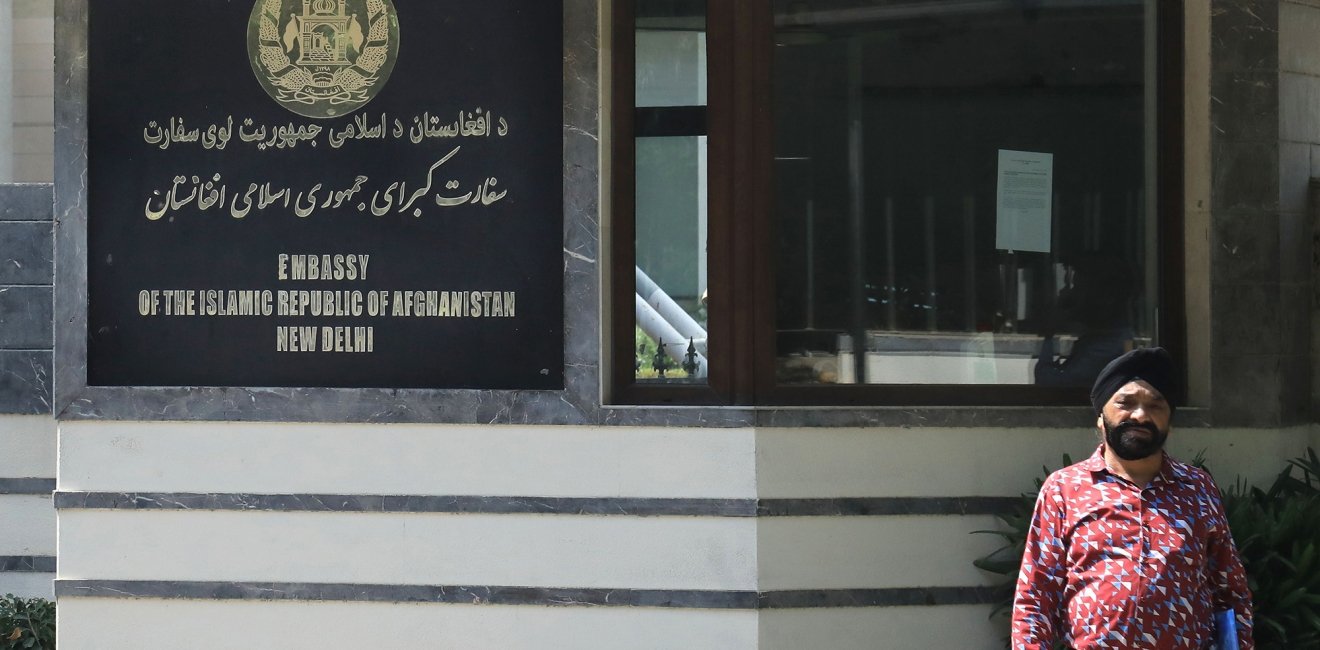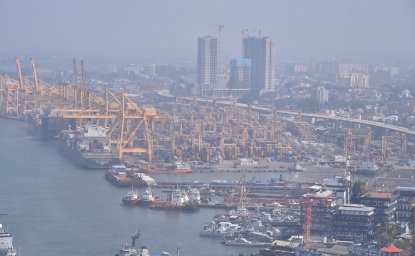
A blog of the Indo-Pacific Program
On November 24, the embassy of Afghanistan in New Delhi, which had been led by diplomats loyal to the pre-Taliban government, was permanently closed. In fact, most of its operations had ended back in October, with the Embassy no longer processing visas or offering scholarships to thousands of Afghan students based in India who reject the Taliban for whatever reason and do not want to return to Afghanistan (some of them fear significant threats to their lives if they go back). Several days later, Taliban officials said that the Embassy will soon reopen with their diplomats running it.
This development has added to the shock being felt by many in Afghanistan, as New Delhi’s policy toward Kabul changes dramatically. Other Indian policy decisions that have raised eyebrows include New Delhi’s immediate recognition of a disputed election in Afghanistan in 2020, and its refusal to grant asylum to fugitive elites and politicians from Afghanistan after the Taliban takeover in 2021. These Indian policy decisions are leading to sharp shifts in Afghan perceptions of India, from a longstanding view of India as a friend willing to help Afghanistan in times of need to a new one of India as a self-interested hegemon.
The Enemy of My Enemy is My Friend
There is a well-known adage of international relations that states, "the enemy of my enemy is my friend.” It is especially apt for the people of Afghanistan, Pakistan, and India, and for two reasons. First, the originator of the saying was Kautilya, an ancient strategist who belonged to all three countries in a sense: He was born in Golla region (in modern-day southern India), studied in Takshashila (in modern-day Pakistan), and lived in Kabul and Kapisa (in modern-day Afghanistan).
Second, throughout the last 75 years, these three countries have defined their tripartite relations based on the “enemy of my enemy is my friend” adage. Indeed, despite the many similarities between the three nations—such as historical memory, civilizational history, culture, and language—“the enemy” has been the driving factor. For example, Pakistan as an enemy has been a key factor in relations between the three countries. At almost all levels of people-to-people, economic, and cultural ties, Kabul and Delhi have historically been unable to sideline the enemy factor, especially due to geography—Pakistan is situated between Afghanistan and India.
Taliban-BJP Bhai Bhai
Since the Taliban took power in Afghanistan in August 2021, the relationship between the Taliban and BJP government has made remarkable progress. However, on the contrary, the relationship between Kabul and Islamabad has deteriorated and is becoming tenser by the day. When the Taliban first took control in 2021, the people of Afghanistan believed that the Taliban were a tool of their longtime patron Pakistan. They also believed that the Taliban’s ascent to power meant that Islamabad had achieved its strategic goals in Afghanistan.
But Taliban views of Pakistan quickly started to change, especially as the group’s ascent to power meant it no longer needed to rely on Pakistan for sanctuary. This means Pakistan has lost leverage over the Taliban. The unanticipated arrival of Faiz Hameed, the Pakistani spy chief, in Kabul soon after the Taliban takeover was followed by internal differences within the Taliban, which many observers perceive to have been triggered by the substantial influence that Islamabad has on the Taliban and differing views within the Taliban about that influence and how to address it following the Taliban’s return to power.
Not surprisingly, it didn't take long for relations between Kabul and Islamabad to become strained. There are many reasons. One is that the Taliban refused, and continues to refuse, to curb the presence of Tehreek-e-Taliban (TTP) terrorists. The TTP stage attacks in Pakistan, but are based in Afghanistan. And they have increased attacks in Pakistan after the Taliban took power in Afghanistan. For example, in January 2022, an explosion in a mosque in the Pakistani city of Peshawar left more than 60 dead.
The Rise of a Pragmatic Relationship
Religious nationalism is on the rise both in India and Afghanistan, as represented by the BJP’s Hindu nationalism in India and Talibani Pashtunism in Afghanistan. Conventionally, there is no convergence of interests between Hindu nationalists and Taliban Pashtunists, except for Pakistanphobia—a mindset that in Afghanistan originated after the emergence of the independent state of Pakistan on the Durand Line bordering Afghanistan. This frontier has consistently been opposed by Pashtun governing regimes in Kabul. Most Pashtun elites, including the Taliban, still consider it a hypothetical line. Of course, the Pakistanphobia of Hindu nationalists is rooted in multiple factors, including Pakistan’s sponsorship of some Islamist terrorist groups.
Despite the Taliban’s officially friendly position toward India, the majority of the Taliban membership see India as a Hindu majority land that has always suppressed Muslims. Seen from the wider global imperative, according to the Taliban, of emancipating oppressed Muslims from infidels, India is Darul Harb (Land of War) in which conducting Jihad is a an obligation to liberate the oppressed Muslim minority. Meanwhile, Hindu nationalists have long seen Afghanistan as a threat to the Hindu identity, and by extension to India’s identify and security, going back to the Ghaznavid and Delhi Sultunate periods. The Ghaznavid invasion of India in the 10th century followed by the establishment of the Delhi Sultanate between 1206 and 1526 have been seen as a threat by Afghanistan.
Despite this history, since August 2021, the relationship between the Taliban and BJP-led India has started to take a different direction, and New Delhi has sought to interact with the Taliban in a more pragmatic way, in order for India to better pursue its interests in Afghanistan, especially those related to security. The Ministry of Foreign Affairs of India announced in a statement in August 2021 that Deepak Mittal, the Indian ambassador in Qatar, had an official meeting with Shir Mohammad Abbas Stanikzai, one of the senior leaders of the Taliban, in Qatar. This meeting was held at the request of the Taliban. In these talks, India's concerns about the possibility of militants in Afghanistan using that country’s soil for terrorist attacks against India, and ensuring the security of Indian citizens in Afghanistan, were discussed. Stanikzai assured the Indian side that such a scenario will not occur. Stanikzai's statement was viewed by India as an opportunity to pursue closer relations with the Taliban. Then, in June 2022, a team of officials from the Ministry of Foreign Affairs of India, led by the Deputy Minister of Foreign Affairs of India, JP Singh, traveled to Kabul—the first official Indian visit to Afghanistan since the Taliban took control of Afghanistan in August 2021. The Indian delegation met with the Acting Minister of Foreign Affairs of the Taliban, Amir Khan Muttaqi, and his deputy, Sher Mohammad Abbas Stanekzai, to discuss Indian aid to Afghanistan. (While this was the first formal meeting between the two sides, in fact, over the two years before the delegation’s visit, there had been some limited communications and secret talks between the Taliban and the Indian Embassy in Qatar.)
Mullah Yaqub even went beyond that and said that the Taliban is interested in entering into military and strategic cooperation with India, and that to achieve that goal, it would first be necessary to reopen the Indian embassy in Kabul.
On the eve of the visit of this Indian diplomatic delegation, Taliban Interior Minister Anas Haqqani and Defense Minister Mullah Yaqub, in a conversation with Indian media, asked New Delhi to resume the activities of its embassy in Kabul. Mullah Yaqub even went beyond that and said that the Taliban is interested in entering into military and strategic cooperation with India, and that to achieve that goal, it would first be necessary to reopen the Indian embassy in Kabul. After the Indian delegation visit to Afghanistan and meeting with the Taliban, India partially reopened its embassy in Kabul. Then, in October 2022, India signed a new agreement with the Taliban that increased the volume of trade between the two countries, especially through an air corridor. After this agreement, the trade minister of the Taliban said that if there is a decrease in the import of wheat from Russia and Central Asian countries, then Afghanistan would follow other options to purchase wheat, including from India.
These growing relations between New Delhi and the Taliban provide key benefits for both of them: For India, they reduce the space for influence to be enjoyed by Pakistan and China in Afghanistan; for India, preventing Pakistan's and China’s influence in Afghanistan is a major part of its geopolitical competition with Beijing and Islamabad. For the Taliban, having alternative sources of support in the region enables it to put more distance between itself and Pakistan's influence, and ultimately the Taliban's anti-Pakistan policy is strengthened. The Taliban had a vital need for Pakistan during the war, because of the sanctuaries and other backing Pakistan provided. But after coming to power, and with the US-led war now over, the Taliban no longer have to rely on Pakistan, through an uneven relationship (Pakistan being superior and the Taliban being inferior) with which the Taliban was never comfortable.
Implications
The evolving relationship between the Taliban and India is tactical, and based on pragmatic considerations about security and geopolitics. Therefore, current Taliban-India relations are neither natural nor based on long-term interests. Both the BJP and the Taliban are aware that there will not be any areas of long-term strategic collaboration. Rather, they are engaging with one another in order to achieve narrowly defined, short-term objectives, including limiting the influence of Pakistan in Afghanistan.
And yet, the nature of these relations is devastating—for Afghanistan and India, as well as for Pakistan and the entire region. Indeed, the politics and relationships of India and Afghanistan are actually working to undermine each other's policies and beliefs.
For example, improving relations between India and the Taliban props up and helps ensure the extension of the life of the Taliban regime in Afghanistan—a regime that fundamentally damages society and governance in Afghanistan.
For India, having ties with the Taliban may help its interests in limiting Pakistan's influence in Afghanistan, but in the long run, it risks causing extremism to take root and spread in Afghanistan and the broader region. Every day that the Taliban reigns in Afghanistan, it gets one step closer to achieving the radicalization of Afghanistan’s society, people, and values. This could mean that in the future, even if the Taliban no longer remains, Taliban thoughts and values may be entrenched.
Another implication of the BJP's ties with the Taliban is an increase in regional insecurity. The Taliban's interest in helping the TTP—with which it is closely allied—allows pragmatistic factions within India’s vast bureaucracy to indirectly support the Pakistani Taliban, too. India has in fact been accused of providing financial support and shelter (in Afghanistan) to the Pakistani Taliban, an anti-Pakistan terrorist group, since 2010. One of New Delhi’s main strategic goals has been to confine Islamabad’s sphere of influence in Afghanistan and beyond in Central Asia, and to prevent Pakistanis from recruiting Islamists for the Kashmir war. And yet, Pakistan remains a key potential player in this story as well. Islamic State-Khorasan (ISK), the branch of Islamic State present in Afghanistan and Pakistan, has been active since the re-emergence of Taliban rule, and as U.S. troops were leaving Afghanistan the group carried out a major attack near the Kabul airport that killed Afghans along with American soldiers. ISK's presence in eastern, northeastern, and northwestern Afghanistan poses a severe security risk to the Taliban, a longstanding ISK rival. The presence of safe havens for ISK’s leadership south of the Durand Line in Pakistan shows that Islamabad can leverage the ISK against the TTP and the Taliban, if needed. A securitized game of Pakistan and India using Islamist militants as proxies for influence in Afghanistan could have adverse effects in the entire region, especially South Asia.
One more implication of the Taliban-India relationship is the discrediting of India's position among the people of Afghanistan. In the last 20 years, India became a friend accepted by almost everyone in Afghanistan, due to New Delhi’s strategic cultural approach and soft aid it provided to Afghanistan. India was a country comfortably settled in Afghans’ historical memory. However, today, India's desire to engage with the Taliban has made Afghans downgrade their view of India to that of a profit-seeking actor. Afghan anti-Taliban leaders, elites, and many within the broader public believe that India does not value the nature of the government and a democratic approach in Afghanistan. What India is seeking in Afghanistan, many in Afghanistan believe, is a close partnership with Kabul—no matter who is in control—that can be used to help reduce the influence of Pakistan and China in Afghanistan. In sharp contrast to the past, there are now politicians, elites, and young scholars and analysts in Afghanistan and among the diaspora who do not define India as a friendly state for Afghanistan.
Policy Recommendations
If India makes some changes to its policies in Afghanistan, it can produce better outcomes for its interests while ensuring it remains a significant and influential player in the region.
- India-Afghanistan ties have long been natural, civilizational, and strategic—except for the past few years, during which religious nationalists in both countries, guided by pragmatism, have refashioned the relationship to make it more short-term and tactical. Limiting relations to countering Pakistan prevents the relationship from truly flourishing. India, because of its long legacy of partnership with the country and its people, including those that oppose the Taliban, has the capacity to position New Delhi’s relations with Afghanistan beyond the Pakistan factor. Re-starting people-to-people contacts, including cultural ties, can have a direct and positive impact on the security of the two countries and regional prosperity. New Delhi can use Afghanistan as a determinant of its regional foreign policy goal of achieving regional stability by working more with different factions in Afghanistan, especially anti-Taliban opposition and resistance fronts. In fact, New Delhi can even become a mediating hub among different Afghan opposition groups to help move toward a political settlement.
- India's global image and branding is that of a nation that values pluralism, democracy, and humanitarian and development aid. And yet, having ties with a Taliban regime responsible for gender, ethnic, and religious apartheid discredits India’s political branding. India's facilitation of and backing for anti-extremist groups, including the anti-Taliban political opposition in Afghanistan and abroad, would boost India's standing in the region as a strong and responsible country in South Asia and the world.
- India has to revive its constructive and strategic engagement in Afghanistan with democratic forces inside and outside Afghanistan. New Delhi’s concerns about Pakistan and Chinese’s influence in Afghanistan are excessive and unnecessary. New Delhi should stop worrying about Chinese and Pakistani leverage in Afghanistan, as China does not have the capacity or the interest to fill the void left by the US and the West in Afghanistan. And the Pakistan-phobia among the people of Afghanistan is a deterrent against Pakistani influence in Afghanistan.
Conclusion
By making Pakistan the central focus of their relationship, India and Afghanistan overlook the great potential for their bilateral ties. Indeed, the BJP’s newly pragmatic policy toward Afghanistan, since the Taliban takeover in 2021, has reduced a strategic partnership to one that is focused on tactical short-term benefits. Additionally, if this new relationship endures into the longer term, it will help prop up the Taliban regime and therefore strengthen and institutionalize Islamic radicalism in Afghanistan, with heavy costs for the security of the region. New Delhi has the potential to play a more responsible and constructive role in Afghanistan.
The views expressed are the author's alone, and do not represent the views of the U.S. Government or the Wilson Center. Copyright 2020, Asia Program. All rights reserved.
Follow the Asia Program on Twitter @AsiaProgram. or join us on Facebook.
Author

Former Afghan Minister of Education

Indo-Pacific Program
The Indo-Pacific Program promotes policy debate and intellectual discussions on US interests in the Asia-Pacific as well as political, economic, security, and social issues relating to the world’s most populous and economically dynamic region. Read more







